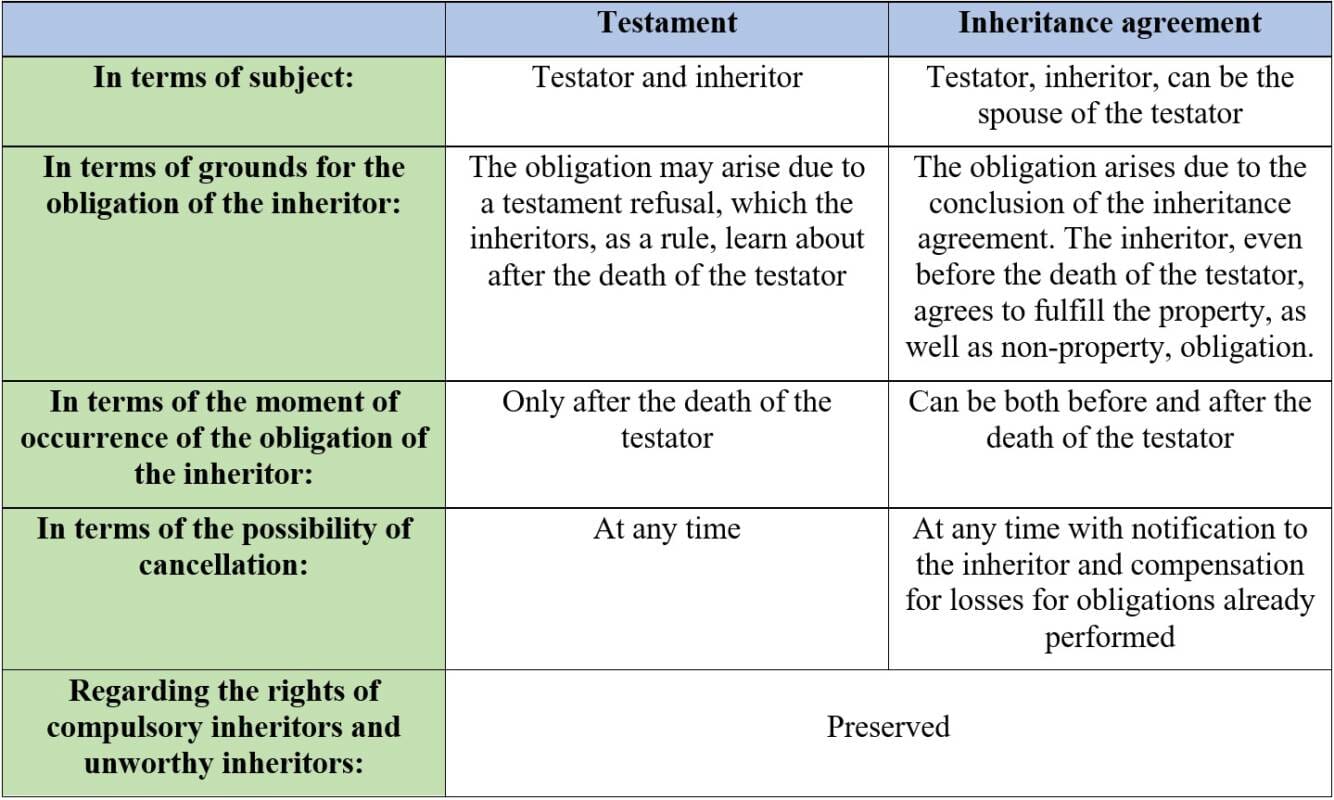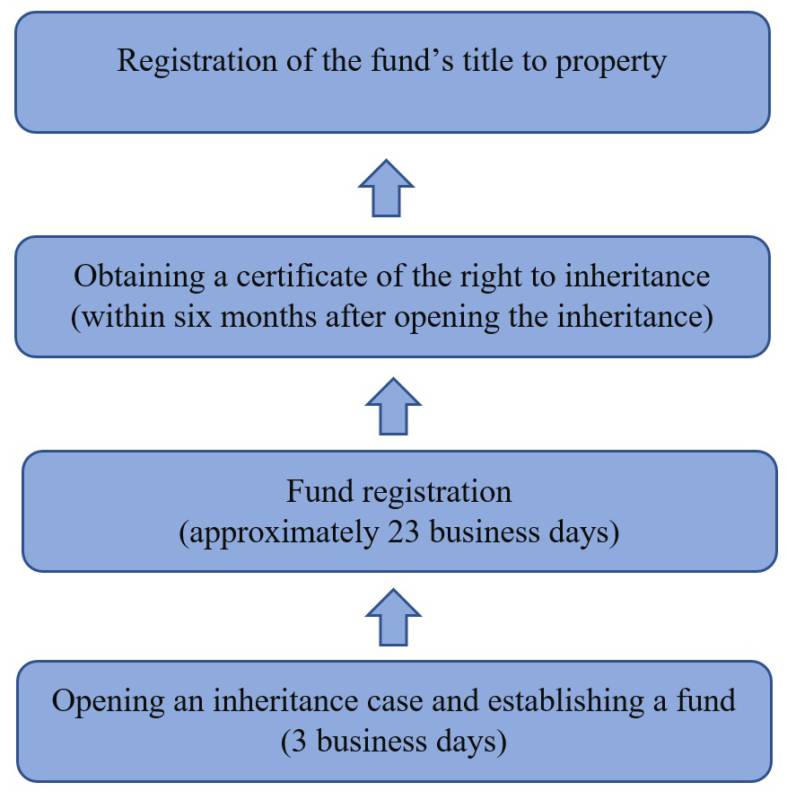How to maintain a family business, consider the interests of all parties involved and reach lifetime arrangements with business partners? To achieve these goals, you can use new inheritance law tools introduced to the Russian law:
(Federal Law dated 29.07.2017 No. 259-ФЗ «On Amendments to Part 1, Part 2 and Part 3 of the Civil Code of the Russian Federation»; Federal Law dated 19.07.2018 No. 217-ФЗ «On Amendments to Article 256 of Part 1 and Part 3 of the Civil Code of the Russian Federation»)
- Joint testament;
- Inheritance agreement;
- Inheritance fund.
What do you need to know about each of these to develop a strategy for the inheritance management of your assets?
JOINT TESTAMENT (Paragraph 4 of Article 1118 of the Civil Code of the Russian Federation (hereinafter the «Civil Code»)
A joint testament is a convenient and simple way to determine the inheritors of both joint and personal property of spouses.
Important:
- It is both spouses who should participate in the preparation of the testament;
- The rule on the mandatory share in the inheritance (Article 1149 of the Civil Code) and on the prohibition of inheritance by unworthy inheritors is not excluded (Article 1117 of the Civil Code).
WHAT ARE THE ADVANTAGES OF A JOINT TESTAMENT?
- There is no need to prepare several separate testaments, conclude a marriage agreement to establish the property regime of spouses;
- The moment of preparation of the joint testament is easy to prove, as it is executed by a notary using video recording.
CAN ONE OF THE SPOUSES CANCEL OR AMEND THE JOINT TESTAMENT?
Yes, they can. In this case, the notary notifies the other spouse about this.
If the marriage is dissolved or invalidated, what will happen to the joint testament?
The joint testament will lose its power. The same consequences will occur in case of preparation of a new testament.
THE JOINT TESTAMENT. CONCLUSION
- Preservation of family property including personal assets of spouses, even taking into account the mandatory share of other inheritors;
- There is always the possibility to cancel a testament jointly or individually;
- Openness of the joint testament, as the second spouse always finds out about its change or cancellation.
INHERITANCE AGREEMENT (Article 1140.1 of the Civil Code)
The testator has the right to conclude an agreement with a person entitled to be called to inheritance. In the inheritance agreement, it is possible to determine the circle of inheritors and the procedure for obtaining inheritance.
As in the case of the joint testament, the fact of completion of an inheritance agreement is easily proved, since it is performed by a notary using video recording.
Important:
- The parties enter into such agreement during their lifetime, but the property is transferred from the testator after its death.
- The effect of the inheritance contract is limited by the rules on the mandatory share, even if the right to the mandatory share arose after its conclusion (A mandatory share is a situation in which certain persons (for example, the testator’s minor or disabled children, its disabled spouse or disabled parents) are entitled to receive at least half of what they would receive by inheritance by law, regardless of the contents of the testament).
WHAT CAN YOU PROVIDE IN AN INHERITANCE AGREEMENT?
- The testator has the right to assign certain duties to the inheritor, providing for their performance both before and after the opening of the inheritance (for instance, to execute testamentary refusals, or testamentary assignments, or to financially support the children of the testator).
- It is possible to stipulate the occurrence of obligations under the inheritance agreement.
WHAT SHOULD YOU REMEMBER WHEN CONCLUDING AN INHERITANCE AGREEMENT?
- The testator is not limited in its right to dispose of the property that is the subject of the agreement, even if this deprives the inheritor of the rights to this property.
- The testator is not limited in the number of possible agreements with inheritors.
- Important: when concluding an inheritance agreement with respect to the same property, only the first agreement will be valid.
- The parties may withdraw from the inheritance agreement subject to the following conditions:
- The testator – having compensated them for losses associated with the already fulfilled obligation under the inheritance agreement;
- Inheritor – without prejudice to other inheritors.
- Modification and termination of the inheritance agreement is only possible during the lifetime of its parties.
WHAT ARE THE SIGNIFICANT DIFFERENCES BETWEEN AN INHERITANCE AGREEMENT AND A TESTAMENT?

IS IT POSSIBLE TO SIMULTANEOUSLY PREPARE AN INHERITANCE AGREEMENT AND A JOINT TESTAMENT?
No, one will lead to the cancellation of the other.
Therefore, two spouses have the right to appoint inheritors in a joint testament and distribute property among them. Or they can conclude an inheritance agreement with the inheritor.
THEINHERIRTANCE AGREEMENT. CONCLUSION
- The conclusion of an inheritance agreement allows you to inform the inheritor about the transfer of property to it by inheritance, its contents and even the cancellation of the inheritance agreement.
- By means of an inheritance agreement, the testator can entrust the inheritor with the performance of duties even before its death.
- The inheritor is not protected from the risk of non-receipt of the asset under the inheritance agreement due to the actions of the testator, and is also limited by the rights of the compulsory heirs.
INHERITANCE FUND (Article 123.20-1 of the Civil Code)
An inheritance fund is a fund for managing property received upon inheritance indefinitely or for a certain period of time in accordance with the conditions of its management.
The costs, and, in general, the rather complicated (comparing with the preparation of a joint testament or inheritance agreement) procedure for establishing an inheritance fund should not be the reason to refuse such instrument.
The essence of the establishment of the fund: the property is transferred to the management of the fund with payment / receipt by beneficiaries of this fund (not to be confused with the inheritors) of all or part of such property.
WHAT ARE THE MAIN ADVANTAGES OF THE ESTABLISHMENT OF THE FUND?
- The testator is not involved in the establishment / registration of the inheritance fund. All that is required of him is to issue a testament at a notary.
- A notary is the one who is responsible for establishing the fund after the death of the testator.
- Any property of the testator is transferred to the management of the fund indefinitely or for a specified period.
- It is to the fund that all the debts of the testator are transferred. The beneficiaries of the property are not liable for the obligations of the fund, therefore, for the debts of the testator.
WHAT IS REQUIRED OF THE TESTATOR?
To prepare a testament.
The testament will provide for the decision of the testator to establish the fund, the charter and the conditions for managing the fund. All other actions are left to the notary.
WHO IS THE BENEFICIARY?
Any person, with the exception of commercial organisations, that is entitled to receive the property of the fund / part thereof.
Important: beneficiaries are not to be confused with inheritors,as one person cannot be both the beneficiary and the heir at the same time.
The beneficiary loses the right to a mandatory share.
The main advantage of the beneficiary is that it is not liable for the debts of the testator.
WHO WILL MANAGE THE FUND?
Governing bodies that are created at the discretion of the testator.
Under the conditions of fund management (contained in the testator’s testament), he determines whether the fund will be managed by a sole body or a collegial one. However, these conditions of fund management are confidential and are not to be disclosed to the registering authority.
Important: You cannot include the beneficiary in the fund management body.
Management bodies are formed within 1 year, otherwise the fund is liquidated.
After the fund is registered, its charter and management terms can only be changed in a judicial proceeding.
HOW MUCH TIME WILL THE ESTABLISHMENT OF AN UNHERITANCE FUND TAKE?
Definitely more than one month.
The entire fund registration procedure can be divided into 4 blocks:

THE INHERITANCE FUND. CONCLUSION
- The testator independently determines the conditions for the functioning of the fund.
- The right of the testator to transfer its property to the inheritance fund remains limited by the rights of the compulsory inheritors.
- Beneficiaries have the right to receive property from the fund, moreover, without any obligation to pay the debts of the testator.
TAX CONSEQUENCES WHEN USING NEW INHERITANCE TOOLS
- Upon receipt of property under a joint testament / inheritance agreement, the heirs do not pay individual income tax (Clause 18 of Article 217 of the Tax Code of the Russian Federation).
- There are no statutory benefits for income in the form of property received by the beneficiary of the inheritance fund. Therefore, the beneficiary pays individual income tax upon receipt of such property.
In case you decide to use the new tools of inheritance planning, we are willing to provide you with comprehensive legal support and offer you models for structuring inheritance taking into account your unique goals and circumstances.
You can also download a presentation (in Russian) on this topic.



